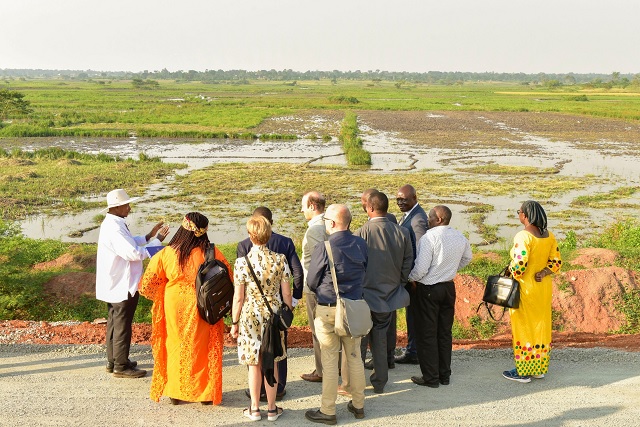
Kampala, Uganda | THE INDEPENDENT | President Yoweri Kaguta Museveni has said people should not be forced to leave wetlands, but instead should be sensitized on why they should leave voluntarily.
Museveni who was speaking at Kalaki primary school in Palisa town council in Palisa district during the commissioning of the Limoto wetland restoration project on Thursday said people should be sensitized and educated about the importance of restoring the wetland but not forcing them to leave.
He said people should be taken to places where restoration programs have taken place and people have embraced them adding that the National Resistance Movement government does not impose projects on people but rather sweet talk them so that they embrace it.
The President invited different ambassadors mainly of the European Union to show them how the government of Uganda is trying to restore the wetlands and conserving the environment.
He said that people encroached on wetlands because of the poverty and search for water for production but did not know to do it until the government intervened and now people can earn 120 million shillings from one acre of land in a wetland unlike the 700000 they would earn before the restoration program per year but also would have saved the wetland water for irrigation.
President Museveni also appealed to the ambassadors that the restoration program needs more funding which they should agitate for.
The President’s remarks come shortly after one person in Namayonyi sub county in Mbale district succumbed to injuries sustained after he was shot by a police during a protest against the Namakole wetland restoration Program.
The residents allege that the ministry and district officials did not sensitize and teach them about the importance of the program and the officials were forcing them to accept the project.
Vincent Bamulanzeki Ssempijja, the Minister of Agriculture, Animal Industry and Fisheries who spoke on behalf of Environment Sam Cheptoris said that the project will see over production of over 175 tons of fish per year.
He said that the Limoto project is a model project but government intends to reach out to all people across the country with the same project.
The United Nations Development Programme-UNDP Resident Representative for Uganda, Elsie G. Attafuah said that Uganda is leading in the levels of wetland degradation in Central and East Africa with 30% between 1994 and 2016.
She cited rice growing as one of the major drivers of wetland encroachment and degradation.
Esther Nakyesa, a resident of Limoto village in Palisa sub county is one of the beneficiaries of the project that started two years ago.
She says that she is now able to earn a living out of the hot culture she practices in the wetland she is able to pay her children’s fees.
Government through the Water and Environment Ministry with Financial and Technical support from the Global Climate Fund (GCF) and United Nations Development Programme (UNDP) are implementing a project dubbed ‘Building Resilient Communities,
Wetland Ecosystems and Associated Catchments in Uganda Project’ aimed at restoring wetlands and increasing the resilience of both ecosystems and the communities living close to the wetland areas. The US$45 Million project is being implemented in collaboration with Ministry of Agriculture, Animal Industry & Fisheries (MAAIF) and Uganda National Meteorological Authority (UNMA).
The Limoto wetland eco-system in Palisa district is among those earmarked for restoration.
The 8-year program that started in 2017 and is expected to end in 2025 is aimed at restoring the environment is being implemented in 24 selected districts in Eastern and the Western Uganda where wetland degradation has been severe.
These include Pallisa, Kibuku, Bukedea, Namutumba, Butaleja, Budaka, Tororo, Kaliro, Ngora and Mbale in the Eastern and Kabale Kisoro, Rukungiri, Kanungu, Bushenyi, Buhweju, Mitooma, Sheema, Rubirizi and Ntungamo districts in South Western Uganda.
******
URN
 The Independent Uganda: You get the Truth we Pay the Price
The Independent Uganda: You get the Truth we Pay the Price





